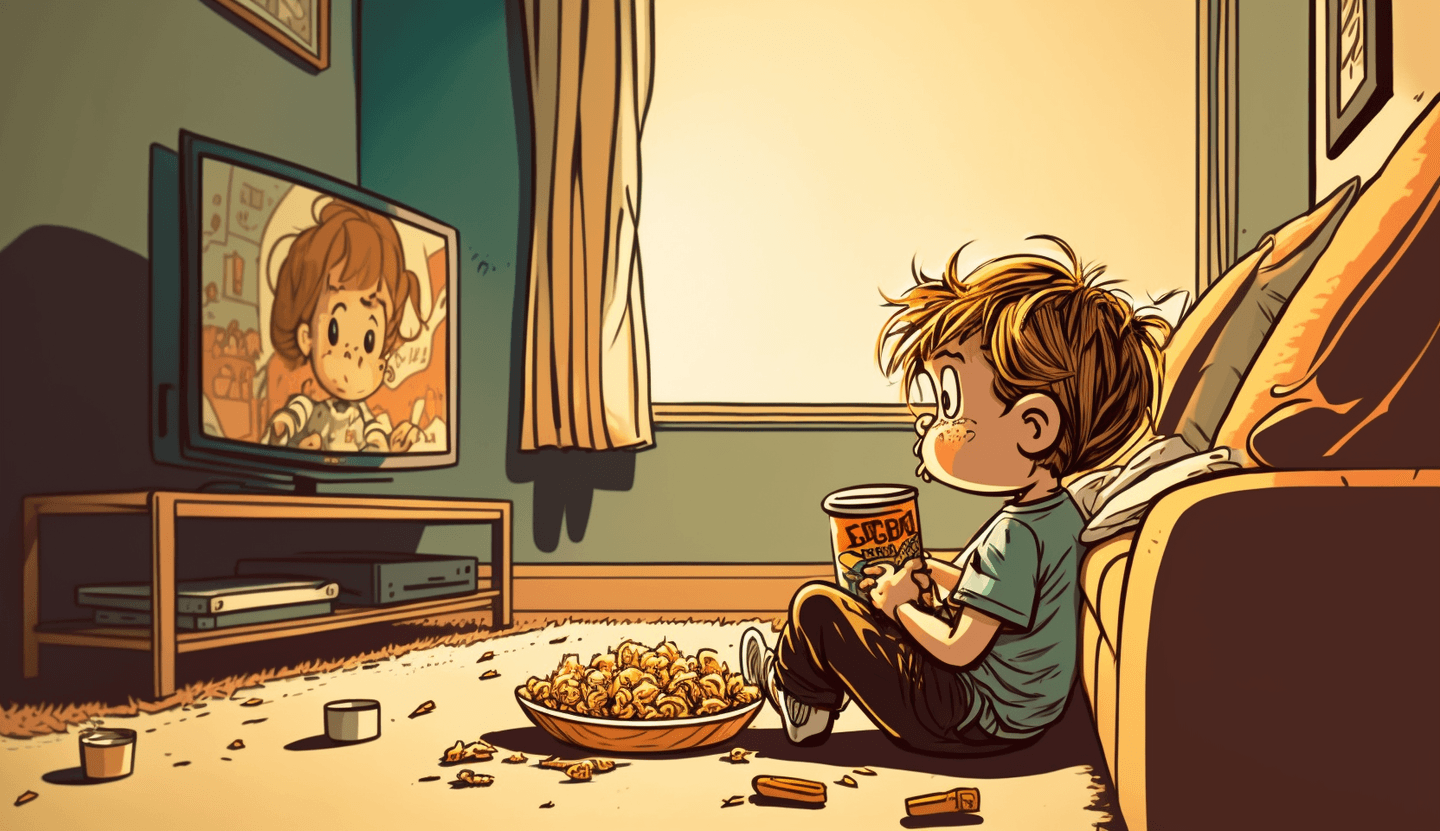The child is not independent and doesn't want to do anything. Help!
The child is not independent and doesn't want to do anything. Help!

First of all, it's worth noting that as long as a parent's mindset is focused on fighting their own child, the battle will not go anywhere, and the child will give them what they want - a battleground. But as soon as we replace the mindset of fighting with the desire to collaborate and understand our closest person, and figure out the reasons for their dependence and laziness, it immediately becomes easier to move on to the next steps.
Let's figure out where this laziness comes from
Let's start with early childhood, when there are no problems with laziness in the family yet. At 2-3 years old, a child is full of exploratory interest, he wants to learn everything and participate everywhere. If mom starts to bake a pie, he is right there, he wants to sprinkle flour, crack eggs into a bowl, he is ready to take a broom and spread dirt on the floor as best he can. When mom soaks the laundry, the little one also wants to try himself in washing. And so in all household chores, a little tail follows the important adult. But what does the adult often do in this moment? Understanding how much dirt there will be later, how they will have to wash both the child and the wet floor, mom asks him to sit in the room while she quickly does everything herself. Often this is accompanied by phrases that the child is still small and cannot handle it, will do it poorly, or get in the way. It is worth noting that around three years old, the willpower is forming, and the crisis of independence begins, when it is simply necessary to give the little person the opportunity to try himself in household chores, to let him tie his own shoelaces and zip up his jacket, even if it takes more time. And already at this stage, it becomes obvious that we, adults, ourselves lay the foundation for laziness and dependence, the habit of the child to stay on the sidelines and not help
By the time a child is 4-6 years old, if they were not allowed to wipe the table after eating since they were two, if their clothes were put in the drawer for them, if they were not allowed to get their hands dirty in flour, or if they were not allowed to be around during cleaning, they get used to this way of living. They will not be as interested in picking out their own clothes to wear for a walk since it's easier and faster for their mom to choose the right clothes from the drawer based on the weather. The mother's worry about whether the child has eaten and whether they're cold could contribute to this as well. Deep-rooted mechanisms for preserving the family are activated, but we don't notice how we deprive another person of the opportunity to learn to feel their own needs and desires by handing them another banana.

During this age period, parents pay a lot of attention to their child's development. They enroll them in clubs and choose the most interesting sections because the child needs to learn how to read, write, swimming is good for posture, the neighbor's daughter goes to gymnastics, and you can't survive in the modern world without robotics. This way, the child develops a daily routine with no time left for free play or even a walk, which has now become a trip from one club to another. The child sitting in their corner with toys increasingly annoys the mother: they still have to do their solfeggio homework and a drawing project, but they're just being lazy.
But it is in play that the child can release their emotions and feelings accumulated during the day, realize their ideas and thoughts, and work through real-life situations. Before the age of seven, play is the leading activity, but adults again show the child that they're doing something wrong, wasting time, going too slowly to their classes, or not wanting to go at all. It is precisely criticism and lack of free time that continue to shape the future dependent personality, which seems lazy. But is it laziness? Will you be willing to do something if for several years you were told not to interfere, not to get in the way, to wait, and now you are loaded with a multitude of tasks, reminiscent of a full day of work for an adult?
From the age of 7-9, children start to actively engage in learning activities and become more interested in interacting with their peers. They learn to manage their own time. However, even here, parents' fears may outweigh and make dad or mom help with packing their bag and double-checking their assignments. Parents don't want their child to receive a bad grade for incomplete work, so they provide help with tasks that the child can already handle independently. This continues to shape the child's understanding that they don't need to take responsibility because their mom will take care of everything anyway

In the ages of 10-14, it can be quite difficult for moms and dads who have already made mistakes in previous stages to deal with their child's deeply rooted habits, as this is precisely when nature intends to overthrow parental authority. This separation is necessary so that the individual can continue to form themselves as a person, but now more than ever they need warm motherly hugs and encouraging words from their fathers. However, as adults, we often sharply perceive attempts by teenagers to challenge our opinions, we continue to press down, often repeating what we dislike: how messy they have become, how tired we are of their mess and laziness. We are currently very dissatisfied with why they are stuck on their phones, not helping around the house, not cleaning up after themselves, and we enumerate a dozen more complaints. We think that by making these lists, we help the child become better, but this negativity is not balanced by anything positive, causing anger and resentment in children, rooting their unwillingness to help. The person is not accustomed to doing something on their own, they have not been allowed to do so for so long, and then suddenly they are scolded for not doing it - this dissonance in the teenager's head increasingly distances them from understanding what they are expected to do. By the ages of 15-18, an individual's personality is already quite formed, and it is difficult to change it at this age. In this period, there is a high risk of losing all connection with the child if nothing changes in the family. After reading the above, don't panic that your child is already ten and you have made some of the listed mistakes. Remember that you are your child's best parent, and if you are reading this article, you are not indifferent to their well-being, and you are on the path to improving family relationships. Now you know that laziness is a formed reaction of a person to certain conditions of life, and it always has a reason. So, what can you do to make your child willing to help and become independent? Here are the main points:
- Let's give even the smallest child more freedom. Let them choose what to wear for a walk. You can give them two options so that they don't go out in completely unsuitable clothes. Involve them in household activities and agree to all their requests to try. Let them, for example, roll their little pie out of dough or mix ingredients for pancakes in a bowl. You will be surprised that each time they will do it more carefully, and eventually they will be able to do it on their own.
- Don't criticize. We are used to scolding, and we take something good for granted. Often, this hinders the child's self-esteem and motivation to complete tasks and keep trying. Why wipe the floor if Mom noticed not how much was wiped, but that one small puddle was still untouched?
- Don't forget to give positive feedback. This is not just praise, but an emphasis on what the child did right specifically. The abstract word "good job" becomes mundane and uninformative over time. It is much more important to show the person what exactly they did well so that they can repeat it later. Also, focus on your emotions from what they did, how pleased you are and how much you appreciate their help. Positive feedback will help the child choose the right behavior in the future that they are praised for.
- Ask for help more often, even if you don't really need it. Ask to wipe the dishes, clean up spilled water, or water the flowers. This will give the child pleasure because Mom cannot cope without such a helper, he is necessary.
- Allow them to be lazy. Remember that every child needs a break when they can take their time without rushing to practice or just play without rules and supervision, make noise, jump on the couch, or, conversely, lie quietly and read not a book from the school program, but comics. An overworked and sleep-deprived child is unlikely to become a good helper, and free play is sometimes really more important than any chores.
- Ask more open-ended questions: those that require a detailed answer, not just "yes" or "no." Ask what the child would like to do around the house. Perhaps they hate washing dishes but would gladly wipe the dust, they were just never offered to do exactly that. Let them try several options for help and choose what they like best. Open-ended questions also help establish a connection with the child, understand what they have on their mind. Such conversations will help you become closer, and your authority will be higher than that of a hooligan from school or a famous blogger.

Dear parents, now you know what to do. Try to cope with your fears for your children's future and allow them to live their own lives, trying and making mistakes, but be there with kind words and support, and everything will work out for you!
Author: Ariadna Tcarkova 




